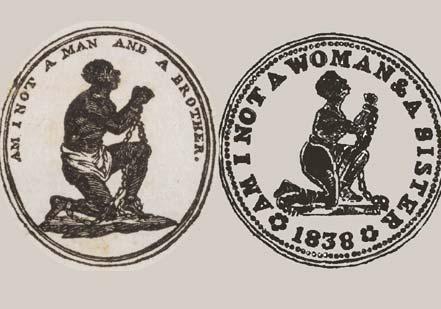The phrase Am I not a man and a brother comes from a famous piece of polemical pottery put out by Josiah Wedgewoon in the 18th Century to assist the campaign for the abolition of slavery. The image above is of a later interpretation of the original medallion that was released in 1787.
The anti slavery advocates were spread wide across the English speaking world and eventually slavery was ended in Britain in 1807 with the first of the anti slavery acts. We can take pride in ourselves as a nation in the fact that it was Britain that led the way in the 18th / 19th Centuries in abolishing slavery, despite having been a slave owning nation herself.
Many other nations followed Britain’s example and have abandoned the practice of slavery. However slavery is still far too common in Yemen, Saudi and other places where people have the misfortune to be ruled by Islam.
But don’t think that Islamic slavery looks like an old episode of ‘Roots’, this slavery isn’t happening in some flyblown desert hovel in some Islamic basket case nation, or on a plantation somewhere, it is happening right under our noses here in the UK. Instead of picking cotton, the Islamic slaves in Britain are overworked and abused in other ways.
The Daily Mail reports that a couple of Muslims have been put on trial at Croydon Crown Court accused of appalling sexual and physical abuse to an illiterate slave who they ‘owned’.
The Mail said:
“An Indian domestic worker was repeatedly raped and beaten by her employers who threatened to murder her if she complained, a court heard.
The 39-year-old vulnerable and illiterate mother-of-four was used as a ‘sexual toy’ and ‘general dogsbody’ by an extended family and their friend who forced her to become their slave for a total of six years.
She was scalded with boiling water, burned with a hot iron, beaten and threatened her throat would be cut and her body buried in a back garden if she didn’t do as she was told, a jury were told today.
Despite the woman approaching numerous agencies for help, Croydon Crown Court heard how the abuse continued.”
It would be interesting to know why she couldn’t be helped earlier, after all slavery is illegal in the UK, judging by this report the police do not look like they are going to come out of this smelling of roses, the fact that the victim has alleged to being pressured to drop the case should have rung alarm bells with the police. The dropping of the case should have looked very suspicious indeed, if the police were doing their jobs properly.
The Mail added:
“The court heard how the woman initially went to live with Aleemuddin Mohammed, 44, a supermarket manager, and his wife Shamina Yousuf, 42, after they successfully applied for the woman’s visa.
Both are accused of assaulting the woman and paying her just £24 during the two years and eight months she worked for them.
The woman was then allegedly forced to moved in with Mohammed’s mother, 56-year-old shop worker Shanaz Begum, and her partner, butcher Enkarta Balapovi, 53, who is accused of raping her.
After escaping the couple, she was then sent to live with an acquaintance of the family, optician Shashi Obhrai, 53, from Northwood, who is accused of assaulting her.
Prosecutor Miss Caroline Haughey said: ‘Each of these defendants treated her with contempt, ignoring her basic rights and taking advantage of her naivety, her vulnerability and her ignorance.
‘Each of the defendants knew of her lack of education, expectation and awareness, both in the UK and India, and used that to get her to comply with their wishes whether as a domestic worker, sexual toy or general dogsbody….”
The list of threats, injuries and abuse is appalling
The report continued:
“When Yousuf allegedly threw a cup at the victim, causing a two inch cut to her foot, she was arrested.
But Mohammed scared the woman into dropping the allegation and the police did not pursue the complaints she made to them.
After two years and eight months with the couple, who paid just £24 for that period, the victim escaped with the help of a Pakistani stranger at a supermarket.
But desperate to get her passport back, she agreed to move in with the couple’s in-laws Balapovi and Begum, where she massaged their legs and feet and was forced to work for £2-per hour at a sandwich shop downstairs.
‘It was while at this address she was subjected to a catalogue of sexual assaults by Balapovi,’ said Miss Haughey.
‘She describes how this happened repeatedly, usually on weekends, Mondays and Tuesdays. She says it happened for: “As long as I lived in the house”.’
After four months with the couple the victim was assisted by a charity and her rape complaints reported to the police, but she was then handed over to an acquaintance of her previous ’employers’, Obhrai, and her ordeal continued.
Her daily routine included cooking for eight people, washing, cleaning, looking after Obhrai’s sick mother and enduring beatings, hair pulling and threats at the hands of the defendant.
She was hospitalised after being pushed down a flight of stairs, struck with a rolling pin, burned with a hot iron and suffered stomach cramps and vomiting when forced to eat out of date food, the jury were told.
Again the victim fled and reported the abuse to police, but no action was taken and the beatings continued, with Obhrai threatening to slit her throat and bury her in the back garden…..The trial continues.”
I’m glad this has come to trial but it is disgusting that it this abuse was apparently allowed to continue for such a long period. Those agencies who it appeared could not help to free this slave may have some questions to answer. I wonder why the police took no action, it couldn’t be because those who were being accused of abuse were Muslim, could it? After the way the police have initially dealt with the Islamic Grooming Gang problem is it any wonder that such a question arises in the mind of the reader?
It makes my blood boil to see the cruelties of Islamic slavery being practised here in the UK and is yet more evidence why much of Islam is not compatible with free societies made up of equally valid citizens. I fear that this case is, like the Islamic Grooming Gang problem, only the tip of the iceberg, and that there may be many people being kept as slaves by Islamic families.
Links
Original Daily Mail story
Durham University time-line for the abolition of slavery
http://www.dur.ac.uk/4schools/Slavery4/timeline.htm
About the Wedgewood medal
http://www.britishmuseum.org/explore/highlights/highlight_objects/pe_mla/a/anti-slavery_medallion,_by_jos.aspx







There is regular abuse of ‘maids’ in Gulf countries. Some are indeed employed as domestic maids, some are treated as slaves and sex toys.
It is appalling that such behaviour as alleged here has been happening in the UK.
If convicted the offenders should be imprisoned.
And the police response should be investigated. I predict that there will be an acknowledgment that ‘mistakes were made by the police’ but that is not enough. Individual officers involved in the decision not to pursue the victim’s complaints should be identified and, if the law allows, they should be prosecuted too.
XX We can take pride in ourselves as a nation in the fact that it was Britain that led the way in the 18th / 19th Centuries in abolishing slavery, despite having been a slave owning nation herself.XX
No you ca’t, because you wern’t.
It was as late as 1811 that Slave trading was made an offence; ++ 1811 Slave trading made a felony in the British Empire punishable by transportation for British subjects and Foreigners.++
Iceland, Sweden, Finland, Denmark, and many other places, abolished slavery WAY before Britain;
>> DENMARK was the first country to out law slavery in modern times, and MANY countries abolished it before Britain;
http://en.wikipedia.org/wiki/Abolition_of_slavery_timeline
1.1 Early timeline
It should be noted that many of these changes were reversed in practice over the succeeding centuries.
• 1102 Trade in slaves and serfdom ruled illegal in London: Council of Westminster
• 1117 Slavery abolished in Iceland
• 1215 Magna Carta recognizes the right to liberty in England
• 1274 Landslova (Land’s Law) in Norway mentions only former slaves, which indi-cates that slavery was abolished in Norway
• 1335 Sweden and Finland make slavery illegal
1.2 [edit] Modern timeline
• 1588 Lithuania and Japan abolish slavery
• 1600 Last villein dies in England
• 1723 Russia abolishes slavery[1]
• 1761 Portugal abolishes slavery[2]
• 1772 Slavery declared illegal in England, including overseas slaves living in England. Lord Chief Justice Mansfield rules that English law does not support slavery.[3]
• 1777 Slavery abolished in Madeira[3]
• 1777 Slavery abolished in Vermont, USA[3]
• 1778 Slavery illegal in Scotland[4][5]
• 1783 Russia abolishes slavery in Crimean Khanate[6]
• 1783 Massachusetts rules slavery illegal based on 1780 constitution[3]
• 1783 Bukovina: Joseph II, Holy Roman Emperor issued an order abolishing slavery on 19 June 1783 in Czernowitz.[7]
• 1787 Sierra Leone founded by British as state for emancipated slaves
• 1787 Society for the Abolition of the Slave Trade founded in Britain[3]
• 1788 Sir William Dolben’s Act regulating the conditions on British slave ships enacted
• 1791 Haiti gains independence and emancipation
• 1792 Slave trading abolished in Denmark (though slavery continues to 1847).
• 1793 Upper Canada, by Act Against Slavery
• 1794 French First Republic abolishes slavery[3] (re-established by Napoleon in 1802)
• 1799 New York State introduces gradual emancipation
• 1802 Denmark abolish slave trade in Danish colonies
• 1802 Slavery re-introduced in France[2]
• 1803 Lower Canada abolishes slavery
• 1804 Haiti abolishes slavery[3]
• 1807 Abolition of the Slave Trade Act: slave trading abolished in British Empire. Cap-tains fined £100 per slave transported.
• 1807 British begin patrols of African coast to arrest slaving vessels. West Africa Squadron (Royal Navy) established to suppress slave trading; by 1865, nearly 150,000 people freed by anti-slavery operations[8]
• 1807 Abolition in Prussia, Germany The Stein-Hardenberg Reforms.
• 1808 United States — importation of slaves into the US prohibited after Jan. 1.[9]
• 1811 Slave trading made a felony in the British Empire punishable by transportation for British subjects and Foreigners.
• 1811 Spain abolishes slavery at home and in all colonies except Cuba,[2] Puerto Rico, and Santo Domingo
• 1814 Dutch outlaw slave trade
• 1815 British pay Portuguese £750,000 (several hundred million dollars in current val-ues) to cease their trade[10]
• 1815 Congress of Vienna. 8 Victorious powers declared their opposition to slavery
• 1817 Spain paid £400,000 by British to cease trade to Cuba, Puerto Rico, and Santo Domingo[10]
• 1818 Treaty between Britain and Spain to abolish slave trade [11]
• 1818 Treaty between Britain and Portugal to abolish slave trade [11]
• 1818 France and Holland abolish slave trading
• 1819 Treaty between Britain and Netherlands to abolish slave trade [11]
• 1821 Ecuador, Colombia, Venezuela abolish slavery
• 1821 Liberia founded by USA as state for emancipated slaves.
• 1822 Greece abolishes slavery.
• 1823 Chile abolishes slavery[3]
• 1827 Treaty between Britain and Sweden to abolish slave trade [11]
• 1829 Mexico abolishes slavery[3]
• 1831 Bolivia abolishes slavery[3]
• 1834 Jamaica abolishes slavery[3]
• 1835 Treaty between Britain and France to abolish slave trade [11]
• 1835 Treaty between Britain and France and Denmark to abolish slave trade [11]
• 1836 Portugal abolishes transatlantic slave trade
• 1838 Slavery abolished throughout the British empire
• 1839 British and Foreign Anti-Slavery Society founded, now called Anti-Slavery In-ternational
• 1839 Indian indenture system made illegal
• 1840 Treaty between Britain and Venezuela to abolish slave trade [11]
• 1841 Quintuple Treaty is signed; England, France, Russia, Prussia, and Austria agree to suppress slave trade[3]
• 1842 Webster-Ashburton Treaty between Britain and USA
• 1842 Uruguay abolishes slavery[3]
• 1843 Honourable East India Company becomes increasingly controlled by Britain and abolishes slavery in India by the Indian Slavery Act V. of 1843.
• 1843 Treaty between Britain and Uruguay to suppress slave trade [11]
• 1843 Treaty between Britain and Mexico to suppress slave trade [11]
• 1843 Treaty between Britain and Chile to suppress slave trade [11]
• 1843 Argentina abolishes slavery[2]
• 1843 Treaty between Britain and Bolivia to abolish slave trade [11]
• 1845 36 British Navy ships are assigned to the Anti-Slavery Squadron, making it one of the largest fleets in the world.
• 1846 Tunisia abolishes slavery
• 1847 Sweden abolishes slavery[12]
• 1848 Denmark abolishes slavery[12]
• 1848 Slavery abolished in all French and Danish colonies[3]
• 1848 France founds Gabon for settlement of emancipated slaves.
• 1848 Treaty between Britain and Muscat to suppress slave trade [11]
• 1849 Treaty between Britain and Persian Gulf states to suppress slave trade [11]
• 1850 United States: Fugitive Slave Law of 1850
• 1851 Brazil ends slave trade[3]
• 1854 Peru abolishes slavery[3]
• 1854 Venezuela abolishes slavery[3]
• 1855 Moldavia abolishes slavery.[13]
• 1856 Wallachia abolishes slavery.[13]
• 1860 Indenture system abolished in British occupied India.
• 1861 Russia frees its serfs in the Emancipation reform of 1861.[14][2]
• 1862 Treaty between United States and Britain for the suppression of the slave trade (African Slave Trade Treaty Act)[11].
• 1862 Cuba abolishes slave trade[3]
• 1863 Slavery abolished in Dutch colonies[3]
• 1863 United States: Emancipation Proclamation declares those slaves in Confederate-controlled areas to be freed.
• 1865 United States abolishes slavery with the Thirteenth Amendment to the United States Constitution.[3]
• 1869 Portugal abolishes slavery in the African colonies
• 1871 Brazil declares free the sons and daughters born to slave mothers after September 28, 1871.
• 1873 Puerto Rico abolishes slavery
• 1873 Treaty between Britain and Zanzibar and Madagascar to suppress slave trade [11]
• 1874 Britain abolishes slavery in Ghana (the Gold Coast) (after Third Anglo-Asante War and British annexation of the Gold Coast in 1874).
• 1886 Cuba abolishes slavery[3]
• 1888 Brazil abolishes slavery[3]
• 1890 Brussels Act – Treaty granting anti-slavery powers the right to stop and search ships for slaves
• 1894 Korea abolishes slavery[15]
• 1896 France abolishes slavery in Madagascar
• 1897 Zanzibar abolishes slavery[16]
• 1905 Siam (Thailand) abolishes slavery[17]
• 1910 China abolishes slavery[18]
• 1923 Afghanistan abolishes slavery[19]
• 1924 Iraq abolishes slavery
• 1924 League of Nations Temporary Slavery Commission
• 1926 Slavery Convention. Bound all signatories to end slavery CONVENTION TO SUPPRESS THE SLAVE TRADE AND SLAVERY (25 Sep 1926)
• 1926 Nepal abolishes slavery[20][21]
• 1928 Iran abolishes slavery[22]
• 1928 Domestic slavery practised by local African elites abolished in Sierra Leone[23] (paradoxically established as a place for freed slaves). A study found practices of do-mestic slavery still widespread in rural areas in the 1970s.
• 1936 Britain abolishes slavery in Northern Nigeria[24]
• 1942 Ethiopia abolishes slavery
• 1948 UN Article 4 of the Declaration of Human Rights bans slavery globally[25]
• 1952 Qatar abolishes slavery
• 1962 Saudi Arabia abolishes slavery
• 1962 Yemen abolishes slavery
• 1963 United Arab Emirates abolishes slavery
• 1970 Oman abolishes slavery
• 1981 Mauritania abolishes slavery[26] (Mauritania has repeatedly abolished slavery. It is the last country to still have chattel slavery.)[27]
• Slavery continues today with illegal human trafficking[28]
http://en.wikipedia.org/wiki/Abolition_of_slavery_timeline
.
Hi Furor, Yes I saw this, but Britain was the first major imperial slave owning and slave trading nation, in the modern era, to abolish slavery. OK granted it took a long time and slavery still went on in parts of the Empire but after 1833, but the major contibution of Wilberforce and others backed up by evidence from African writers like Olaudah Equiano cannot and should not be overlooked. Although you could cite Russia as a major nation that abandoned slavery, people were still subject to Serfdom.
I still think that Britain can be proud of its major contribution to the abolition of slavery and it was the Royal Navy which interdicted the Islamic East African slave trade.
http://www.royalnavalmuseum.org/visit_see_victory_cfexhibition_eastafrica.htm
The problem with Islamic slavery is it, like other forms of people trafficking still goes on even in countries like Yemen which have ostensibily abolished it.
slightly off topic. Have you read CLR James’s ‘Black Jacobins’? It is a ripping yarn about the life of the slave rebellion leader Toussaint L’Ouverture and the revolution on the island of Haiti. If you haven’t then give it a go. Although CLR James was a Marxist and was writing in 1938 (which does inform some of the tone of the text) it is still a fabulous book.
XX but Britain was the first major imperial slave owning and slave trading nation, in the modern era, to abolish slavery. XX
Norway 1274, Sweden 1335, Lithuania 1588, (Last three, need I mention the importance of the Hansa league??, France 1794, Denmark 1802, Prussia 1807, U.S 1808, Britain as latecomers, band wagon jumpers and coat tail hangers, 1811.
None of those were “Major”???? And only the U.S (Possibly Lithuanis as well….?) was not “Imperial”.
The anti slavery legislation in the UK came in in 1807 but did I grant take time to implement. I understand the earlier Hansa league abolitions but I am primarily concerned with the large abolitionist movement that came up from the English speaking world from the 18th Cent, which is what I term the modern political era, which succeeded despite there being a slave trade of considerable size and a lot of pro slavery vested interests.
France also attempted to re introduce slavery at one point. Although Prussia abolished slavery in 1807, was slaving or the slave trade as big a thing there as it was for Bristol or Liverpool for example? It may have been a less difficult fight to abolish slavery in Prussia than in the UK.
Damn. Forgot the “Mail me” button.